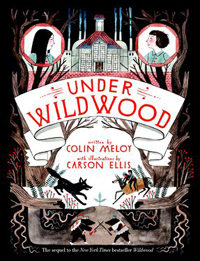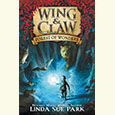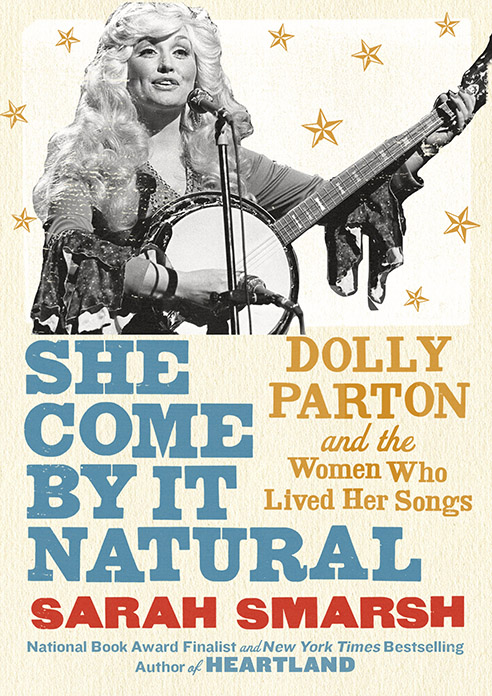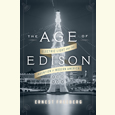Weirdlandia
Decemberists frontman Colin Meloy and his wife, illustrator Carson Ellis, continue their playful exploration of a mythical land at the edge of America’s most proudly peculiar city
Portland, Oregon, has long been both celebrated and ridiculed for its unapologetic quirkiness and hipster-friendliness—a place where chunky glasses and ironic mustaches are now only ironic in their ubiquity; where the forests are green and the people are greener; where fixed-gear bicycles power the lights and refrigerators in fancy craft-beer brew pubs. From this proudly peculiar milieu emerges Colin Meloy, best known as the frontman and primary songwriter for the Decemberists, an eclectic folk-rock band that stumbled into the mainstream last year with its chart-topping sixth album, The King Is Dead. Prior to their unlikely popular success, the Decemberists were best known for their darkly ironic sensibility and a penchant for the macabre. Both traits are on ample display in the first two volumes of The Wildwood Chronicles, Colin Meloy’s auspicious venture into the world of children’s fantasy fiction, featuring illustrations by the artist Carson Ellis, to whom Meloy is married.
 The best-selling first volume, Wildwood, introduces Prue McKeel, a quintessential Portland tweener. Prue is swept into a world of talking forest animals and violent territorial turf wars in the Impassable Wilderness when a murder of crows carries away her baby brother to be used in a black-magic sacrifice by Alexandra, the exiled Dowager Governess of the South Wood. The Impassable Wilderness is, in fact, a mythic reimagining of Forest Park, the 5,100-acre public-forest preserve along the edge of the Willamette River near downtown Portland. There, with the help of her friend Curtis, the talking rat Septimus, and an army of talking coyotes and foxes, Prue rescues her brother from the clutches of Alexandra and helps restore peace to Wildwood before returning home, leaving Curtis behind to join up with the talking foxes as a member of the “Bandits of the Wood.”
The best-selling first volume, Wildwood, introduces Prue McKeel, a quintessential Portland tweener. Prue is swept into a world of talking forest animals and violent territorial turf wars in the Impassable Wilderness when a murder of crows carries away her baby brother to be used in a black-magic sacrifice by Alexandra, the exiled Dowager Governess of the South Wood. The Impassable Wilderness is, in fact, a mythic reimagining of Forest Park, the 5,100-acre public-forest preserve along the edge of the Willamette River near downtown Portland. There, with the help of her friend Curtis, the talking rat Septimus, and an army of talking coyotes and foxes, Prue rescues her brother from the clutches of Alexandra and helps restore peace to Wildwood before returning home, leaving Curtis behind to join up with the talking foxes as a member of the “Bandits of the Wood.”
Under Wildwood opens with Prue back home, unaware of the discord growing in Wildwood as a result of the “Bicycle Coup.” The Dowager Governess lurks at the periphery of the story (presumably set to return in the third volume); the primary antagonists are a trio of fox assassins dispatched to eliminate Prue and a cartoonish industrialist who exploits orphaned children for factory labor and wants to drain the natural resources of the Impassable Wilderness. When Prue narrowly escapes her assailant’s first murder attempt, she returns to Wildwood to seek out the source of the threat on her life and, again, to aid Curtis in restoring peace and order to the kingdom. In doing so, the pair find themselves drawn down into a hidden, underground world with its own rulers, protracted battles, and conflicts.
 Under Wildwood continues the standard Meloy and Ellis establish in the first volume for blending the traditional elements of fantasy fiction with an unsurprisingly clever, witty take on the juxtaposition of magical forests and coffee houses frequented by vegan pacifists on bicycles. There are clear shades of Tolkien and Narnia and Harry Potter and even Dickens, but with a dry humor and offbeat delivery appropriate to the children of the YouTube generation. There’s also a clear sense that Meloy simultaneously means to appeal to the Gen-X parents of Under Wildwood’s target audience. “For the first time in her life,” Meloy writes of Prue, “she was feeling the nagging pull of adulthood, and she did not like it one bit.” Joffrey Unthank, the orphan-exploiting industrialist, keeps his coffee table covered with magazines such as DUMP! and The 1% Journal. Unthank’s factory echoes with maxims blared from a loudspeaker that call to mind the Newspeak of Orwell’s 1984: “MACHINE PARTS MAKE MACHINES. MACHINES MAKE CONVENIENCE. CONVENIENCE IS FREEDOM. FREEDOM IS FAMILY.”
Under Wildwood continues the standard Meloy and Ellis establish in the first volume for blending the traditional elements of fantasy fiction with an unsurprisingly clever, witty take on the juxtaposition of magical forests and coffee houses frequented by vegan pacifists on bicycles. There are clear shades of Tolkien and Narnia and Harry Potter and even Dickens, but with a dry humor and offbeat delivery appropriate to the children of the YouTube generation. There’s also a clear sense that Meloy simultaneously means to appeal to the Gen-X parents of Under Wildwood’s target audience. “For the first time in her life,” Meloy writes of Prue, “she was feeling the nagging pull of adulthood, and she did not like it one bit.” Joffrey Unthank, the orphan-exploiting industrialist, keeps his coffee table covered with magazines such as DUMP! and The 1% Journal. Unthank’s factory echoes with maxims blared from a loudspeaker that call to mind the Newspeak of Orwell’s 1984: “MACHINE PARTS MAKE MACHINES. MACHINES MAKE CONVENIENCE. CONVENIENCE IS FREEDOM. FREEDOM IS FAMILY.”
There is also the black-comic wit that has earned Wildwood comparisons to another popular Portland export, Portlandia, which features Saturday Night Live alum Fred Armisen and another rocker, Carrie Brownstein (of Sleater-Kinney fame), in a variety of sketches that affectionately send up Portland’s eccentricities. Only in Portland, it seems, would an assassin tell her prey, “I would appreciate it if you didn’t make this last moment too labor intensive.”
Knowing that the authors of Under Wildwood are raising a son about the same age as Prue and Curtis, and that they live in a home at the edge of Grant Park and its Wildwood Trail system, one can’t help but imagine Meloy and Ellis occupying themselves on family hikes or sitting up in bed at night, making it up as they go along. This, of course, is what every writer of fiction should be doing, but—for the knowing adult reader, at least—suspension of disbelief can be challenging when the heroine picks up a Pabst Blue Ribbon bottle and observes that PBR “to her best recollection, was not of Woodian brew.”
The Wildwood Chronicles are not chiefly meant for the knowing adult reader, of course. The winks and nods to the grownups are the same as those that have been found in every Disney, Pixar, or Dreamworks production since Robin Williams’s genie did his Jack Nicholson and William F. Buckley impressions in Aladdin: something thrown in for Mom and Dad’s amusement while the kids disappear into the richly imagined world of the story. For young readers, the pleasures of Under Wildwood will be found not in the clever quips or even in the talking animals or magical incantations, but in the struggles faced by Prue, Curtis, and the exploited orphans, who must survive not only assassins, corrupt industrialists, and magical turf wars, but—worse—adolescence.
Colin Meloy and Carson Ellis will discuss Under Wildwood at the Nashville Children’s Theater on October 1 at 6:15 p.m. This free event is part of the Salon@615 series.


